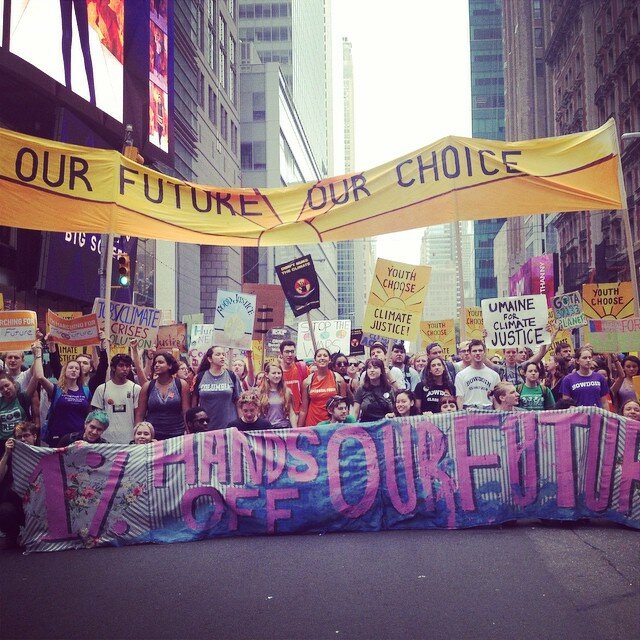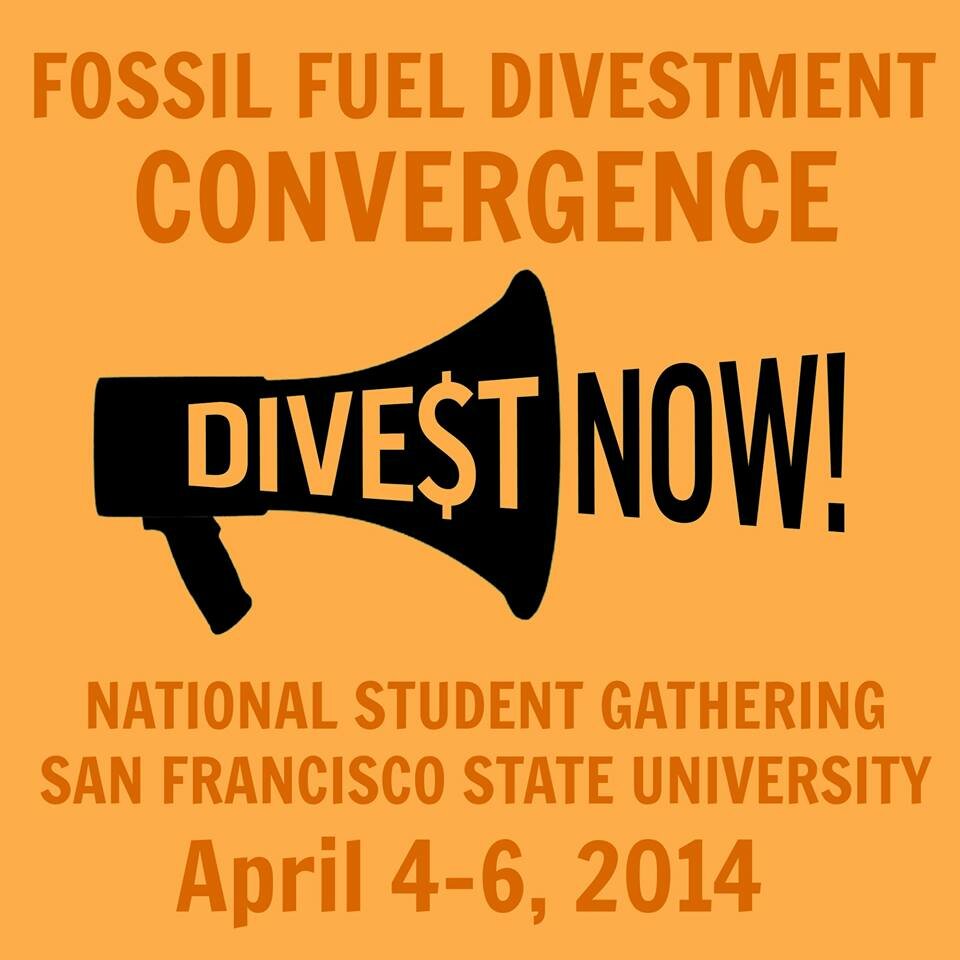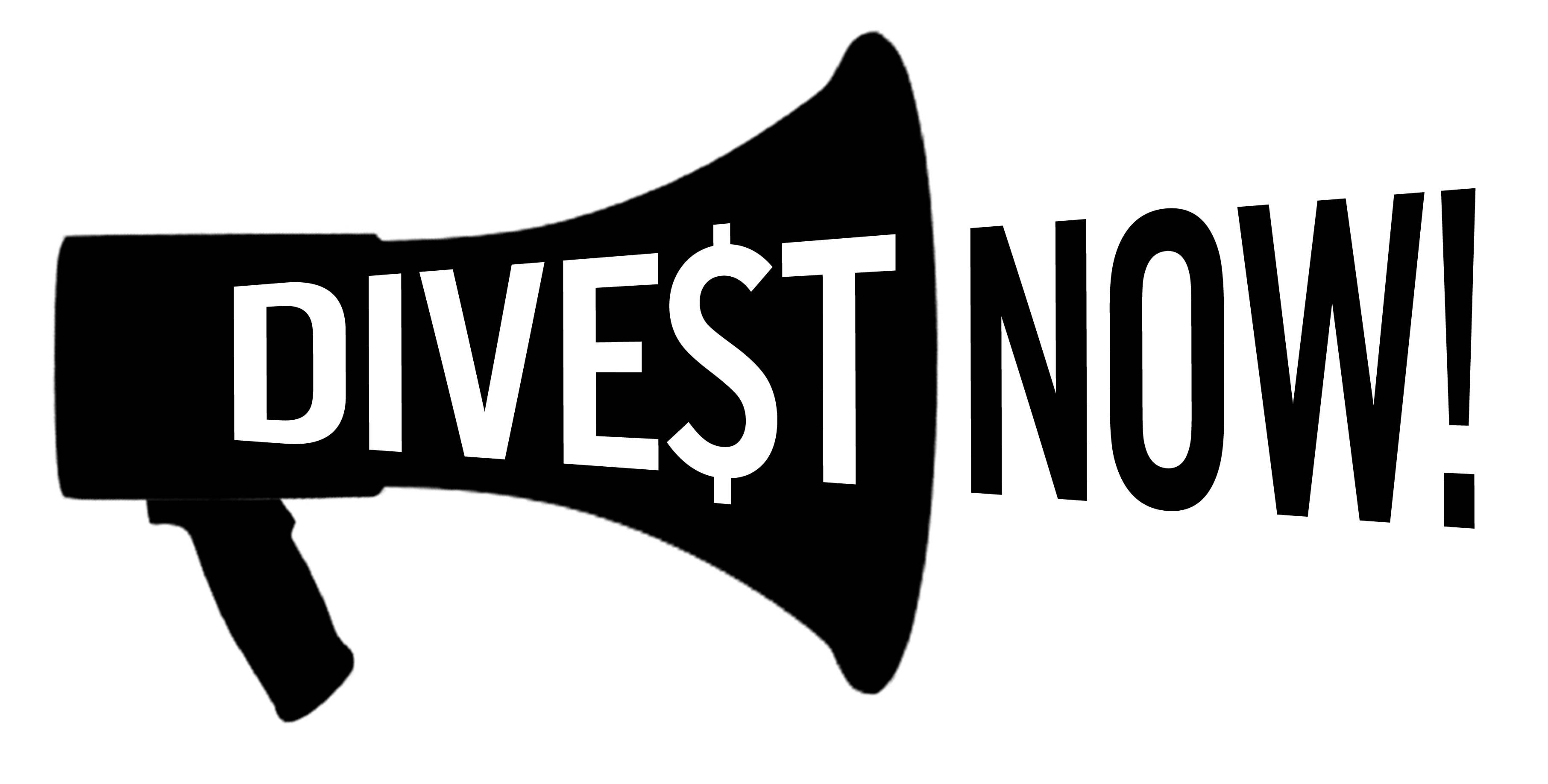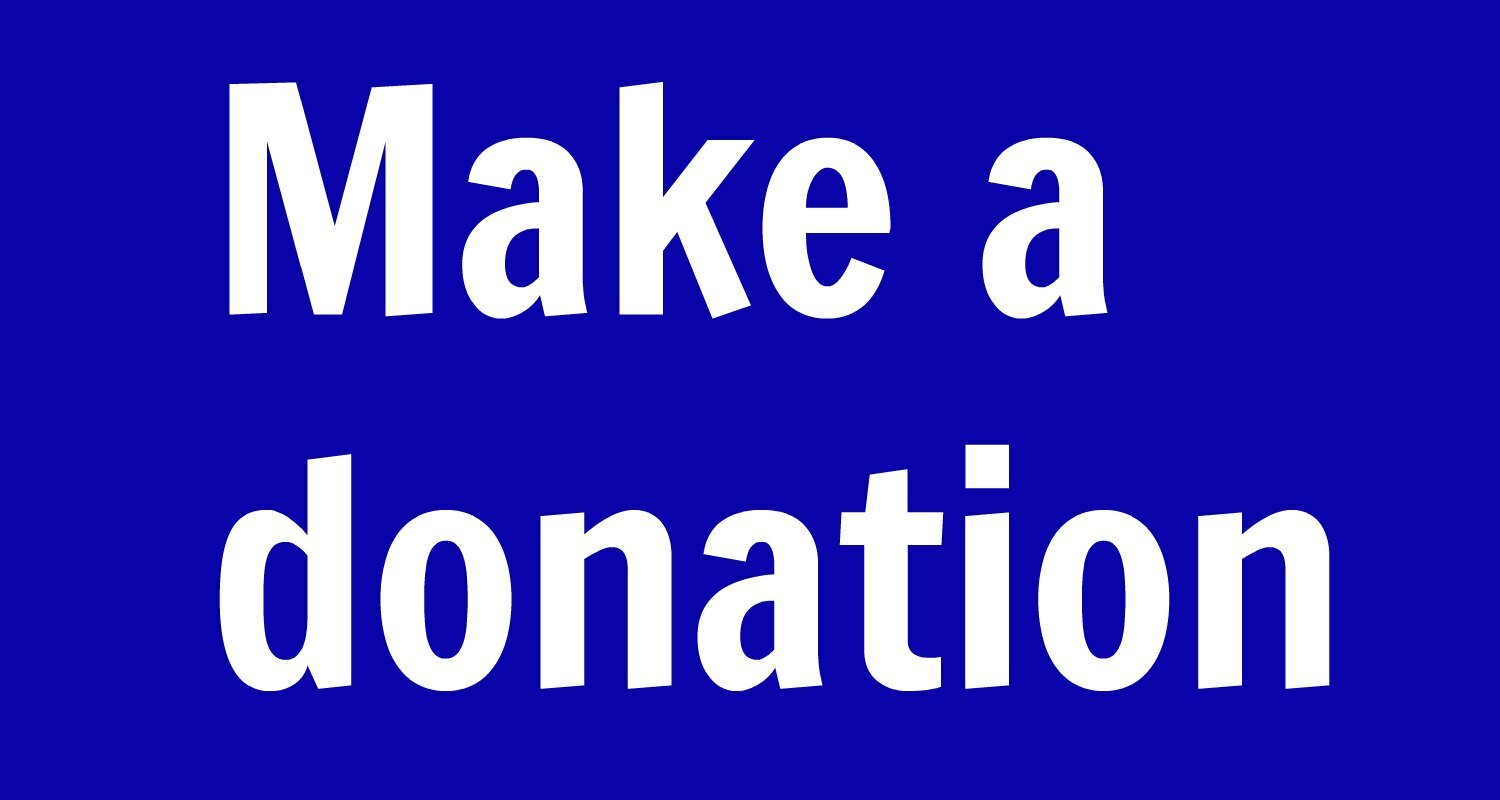by Sara Blazevic, Swarthmore College
reposted from gofossilfree.org
The summer after my freshman year of college – and my first year working on Swarthmore Mountain Justice’s fossil fuel divestment campaign – I went down to West Virginia to witness mountaintop removal coal mining firsthand, and to hear the stories of people who had been directly impacted by the coal industry. I returned to Swarthmore wanting to organize tree sits on the main walkway of our campus and looking forward to attaching myself to a member of our Board of Managers via U-lock, a la many of the direct actions I’d heard about Appalachian anti-extraction activists taking. I wanted our campaign to escalate because I felt the urgency of the climate crisis much more vividly while in West Virginia than while on Swarthmore’s pristine campus, and I thought that escalating meant bringing that urgency to our Board through highly confrontational tactics.
It seems incredibly obvious in hindsight that employing any of these “escalatory” tactics would have been a disaster. But at the time, what seemed obvious to me was that, if only Swarthmore Mountain Justice (MJ) could demonstrate to our Board the clarity of the connections between our investments and the destruction wrought by the fossil fuel industry, we would win. Our logic was as follows: If we force them to listen to us, they’ll be forced to acknowledge the moral necessity of divestment. They’re not climate deniers, after all – they just need to be educated on how their choices are impacting the world beyond Swarthmore, and then they will be spurred to action. We believed that our most valuable tools as student activists were the cogence of our arguments and the raw power of our actions.
Obviously, that wasn’t true. We repeatedly presented the Board with excellent arguments, testifying in Board meetings, meeting with them one-on-one, publishing op-eds, articles, and reports, and bringing socially responsible investment professionals to speak on campus. We delivered the petition signatures of a majority of the student body, and flooded a Board meeting with over 200 students. And yet, we did not win.
In the nearly four years since students at Swarthmore College decided to start a fossil fuel divestment campaign, we’ve had time to make lots of mistakes and learn a ton. The short version of of our “lessons learned”: in order to win, we need to build power.
MJ’s unsuccessful escalation two years ago taught me that, if we are truly in this movement for the long haul, we cannot afford to waste our energy on actions that set up unrealistic expectations and leave us feeling demoralized, disempowered, and unsure of our next move. If we believe that it will take a massive social movement to transition our society away from fossil fuels, it is imperative that our campaigns take the time to:
1) develop the leadership of members so that we don’t just mobilize activists to turn up for our protests, but actively work to produce organizers, who will take their skills into the world beyond college and apply them to ongoing social justice struggles;
2) engage deeply and critically with the power dynamics we are working to move, so that when we are ready to apply pressure to power-holders, we know what to expect.
While flash-in-the pan actions can serve to recruit new people, re-energize members, and make campaigns more visible, when they are not situated within a long-term strategy plan and a vision, they cannot win a campaign. Every action we plan needs to have a clear purpose and logic to it, that is intentionally connected to what comes next. Working with our campaigns to develop strategic plans means working to answer the questions, What will public support (i.e. students, staff, faculty, and Board members) for each of our campaigns look like at the moment of victory? How will we get there? What are some of the major moments along the way?
This allows us to develop our tone of engagement, our messaging, and the power that is being leveraged through actions, over time, instead of starting from scratch every time we want to apply pressure to our targets. More importantly, we need to keep in mind that our actions, no matter how creatively-conceived or carefully executed, cannot substitute for the work of organizing people through building relationships, training on different campaign skills, and learning what each member of our organization needs to work on in order to feel empowered.
It’s incredibly exciting for me to look at how far the fossil fuel divestment movement has come in such a short time. During my first year working on Swarthmore Mountain Justice’s campaign, I never even heard the word “movement” attached to “fossil fuel divestment” – and now, in the last week alone, fossil fuel divestment has been covered by the New York Times three times. Now that we’ve built a youth movement with legs, we have a responsibility to use our power wisely. That is why, when the fossil fuel divestment movement escalates, I don’t mean that we’ll be getting out our U-locks. I mean that we will be coordinating a strategic escalation that builds wide support for fossil fuel divestment across the country and makes it exponentially harder for our colleges and universities to continue upholding the fossil fuel-dominated status quo.
Imagine actions on twenty (or thirty, or forty) campuses around the country, taking place over the course of several weeks, ranging from building occupations to performance art to rallies and marches, each demonstrating the power built by their individual campaigns while reinforcing the narrative that the fossil fuel divestment movement is connected, is powerful, and is continuing to grow.
Here’s to a winter of building power and strategizing together, in anticipation of an impactful spring.
To talk with other campaigns that are planning to escalate over the course of this year, join this google group: .







 Gopal Dayaneni is a member of Movement Generation. Gopal has worked for social, economic, and environmental justice through organizing & campaigning, teaching, writing, and speaking since the late 1980′s. He has been a campaigner for Silicon Valley Toxics Coalition on human rights and environmental justice in the high-tech industry and the Oil Campaigner for Project Underground, a human rights and environmental rights organizations which supported communities resisting oil and mining exploitation around the world. Gopal has also provided progressive organizations with support in Strategic Communications and Campaign Planning through the Design Action Collective and is an active trainer and organizer with the Ruckus Society and a member of the Progressive Communicators Network. Gopal is also an elementary and early childhood educator, working formerly as a teacher and as the co-director of the Tenderloin Childcare Center, a community based childcare center supporting children and families forced into homelessness.
Gopal Dayaneni is a member of Movement Generation. Gopal has worked for social, economic, and environmental justice through organizing & campaigning, teaching, writing, and speaking since the late 1980′s. He has been a campaigner for Silicon Valley Toxics Coalition on human rights and environmental justice in the high-tech industry and the Oil Campaigner for Project Underground, a human rights and environmental rights organizations which supported communities resisting oil and mining exploitation around the world. Gopal has also provided progressive organizations with support in Strategic Communications and Campaign Planning through the Design Action Collective and is an active trainer and organizer with the Ruckus Society and a member of the Progressive Communicators Network. Gopal is also an elementary and early childhood educator, working formerly as a teacher and as the co-director of the Tenderloin Childcare Center, a community based childcare center supporting children and families forced into homelessness. Deirdre Lally is an organizer and organic farmer in rural central Pennsylvania. After years spent in campaigns against mountaintop-removal coal financiers, she learned that hydraulic fracturing for natural gas had come to her family’s home on the Marcellus Shale in Pennsylvania, and began organizing. Since gas drilling’s arrival in PA in the early 2000′s, she has been involved in direct action campaigns to protect state forests from drilling, quick-response community support efforts such as Save Riverdale, and is now involved in a listening project in a heavily fracked county in PA and community outreach and movement base-building work with the Shalefield Organizing Committee.
Deirdre Lally is an organizer and organic farmer in rural central Pennsylvania. After years spent in campaigns against mountaintop-removal coal financiers, she learned that hydraulic fracturing for natural gas had come to her family’s home on the Marcellus Shale in Pennsylvania, and began organizing. Since gas drilling’s arrival in PA in the early 2000′s, she has been involved in direct action campaigns to protect state forests from drilling, quick-response community support efforts such as Save Riverdale, and is now involved in a listening project in a heavily fracked county in PA and community outreach and movement base-building work with the Shalefield Organizing Committee. Freddy Lozano: Born in Barranquilla, Colombia and a union leader and social activist since 1990, Freddy studied Industrial Maintenance in Colombia’s main technical institute. He has completed his seventh semester in the Simón Bolívar University Law School in Barranquilla. He has been president of the Puerto Bolívar chapter of the National Union of Workers in the Coal Industry (SINTRACARBÓN). In 2009, he received the first “positive” prize awarded by Public Eye in Davos, Switzerland, for his work supporting the communities affected by the Cerrejón coal complex. He works for the CERREJON company (owned by BHP Billiton, Anglo American, and Xstrata), which operates the largest open-pit coal mine in Latin America.
Freddy Lozano: Born in Barranquilla, Colombia and a union leader and social activist since 1990, Freddy studied Industrial Maintenance in Colombia’s main technical institute. He has completed his seventh semester in the Simón Bolívar University Law School in Barranquilla. He has been president of the Puerto Bolívar chapter of the National Union of Workers in the Coal Industry (SINTRACARBÓN). In 2009, he received the first “positive” prize awarded by Public Eye in Davos, Switzerland, for his work supporting the communities affected by the Cerrejón coal complex. He works for the CERREJON company (owned by BHP Billiton, Anglo American, and Xstrata), which operates the largest open-pit coal mine in Latin America. Marcel Jones is the Chair of the Black Student Union at UC Berkeley and resident of Afro House (part of the Berkeley Student Cooperative), Marcel Jones is a student organizer dedicated to communal resistance and cross-cultural coalition building. Marcel has experience participating in multiple organizing spaces including the UC Berkeley divestment campaigns from Israeli occupation and the Prison Industrial Complex. Current efforts that Marcel is working on include the No2Napolitano campaign, UC Prison Divestment, increasing resources for Black students, chairing a conference addressing the school-to-prison pipeline, and increasing people of color cooperatives. Coming from a power to the people mentality and an intersectional framework, Marcel believes in leading with dreams rooted in a critical analysis of our realities.
Marcel Jones is the Chair of the Black Student Union at UC Berkeley and resident of Afro House (part of the Berkeley Student Cooperative), Marcel Jones is a student organizer dedicated to communal resistance and cross-cultural coalition building. Marcel has experience participating in multiple organizing spaces including the UC Berkeley divestment campaigns from Israeli occupation and the Prison Industrial Complex. Current efforts that Marcel is working on include the No2Napolitano campaign, UC Prison Divestment, increasing resources for Black students, chairing a conference addressing the school-to-prison pipeline, and increasing people of color cooperatives. Coming from a power to the people mentality and an intersectional framework, Marcel believes in leading with dreams rooted in a critical analysis of our realities.
